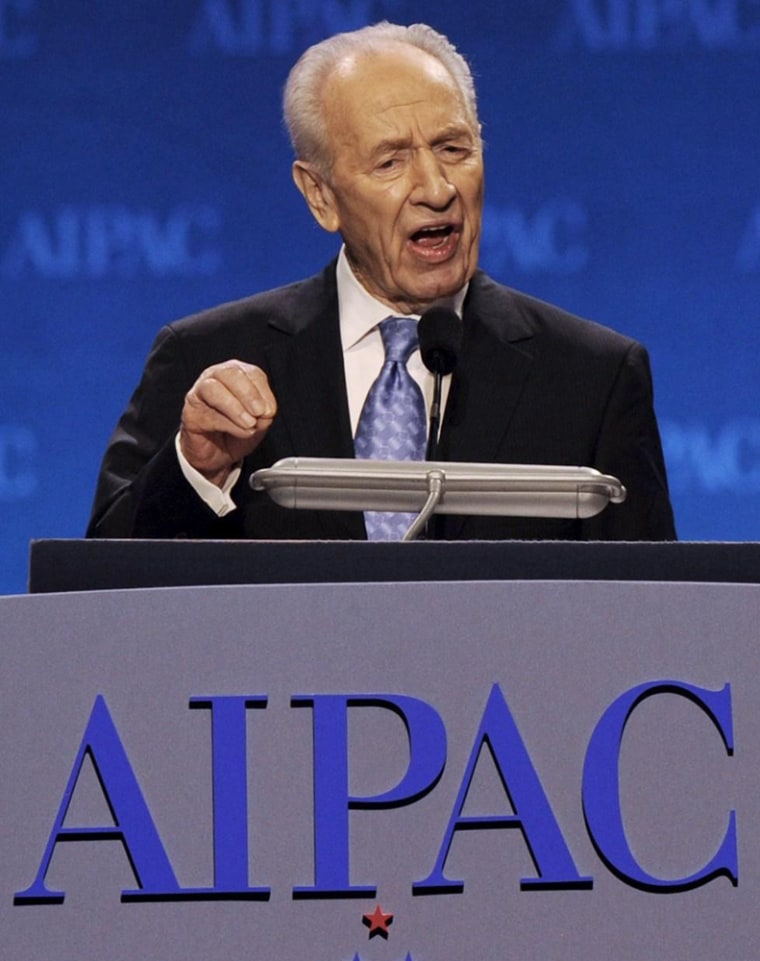Israel dispatched top officials to the U.S. and Europe on Monday in a diplomatic offensive aimed at softening the hawkish image of Prime Minister Benjamin Netanyahu's new government.
The country's contentious foreign minister, Avigdor Lieberman, told his Italian hosts that Netanyahu's government is committed to peace, while President Shimon Peres delivered the same message to Jewish leaders gathered in Washington.
The two also emphasized Iran in an apparent attempt to downgrade the Palestinian issue. Both stressed that Iran is the main regional threat, dismissing Tehran's contention that its nuclear program is peaceful and not aimed at making weapons. Netanyahu was expected to follow that lead in an address later Monday.
Lieberman's goal is to show that he is not the anti-Arab racist often described in Arab and European media, a result of his harsh statements in the past.
Loyalty oath
Last year from the parliament podium, he cursed President Hosni Mubarak of Egypt for refusing to visit Israel. In the recent Israeli election campaign, he ran on a pledge to demand that Israel's minority Arabs take a loyalty oath or lose their citizenship.
Lieberman has not tempered his tough pronouncements since becoming Israel's top diplomat. He has denounced past partial peace deals handing land to the Palestinians as encouraging extremism and ridiculed U.S.-sponsored peace talks over the past year.
In Rome on Monday, Lieberman skirted the issue of a Palestinian state, putting him on a possible collision course with U.S. and EU efforts for a solution to the region's conflict.
"This government's goal is not produce slogans or make pompous declarations, but to reach concrete results," he said when asked if he would ever endorse creation of a Palestinian state. A decade of Mideast peacemaking has been based on the assumption that the outcome would be a Palestinian state living in peace next to Israel.
Lieberman, who will also visit France, Germany and the Czech Republic in his first official trip as foreign minister, called Iran "a destabilizing factor for the whole world" and the main problem in the Middle East.
Focus on Iran
Netanyahu was to address the American Israel Public Affairs Committee convention from Jerusalem by video link later Monday. He was expected to concentrate on Iran, leaving the Palestinian issue as secondary.
Peres spoke at the AIPAC convention in person and is set to meet President Barack Obama on Tuesday, two weeks before Netanyahu's first visit in a sequence seen by some as a mild slap at Netanyahu.
Following the Iran-first strategy, Peres warned that Iran's nuclear program threatens the U.S., Europe and Arab nations, as well as Israel.
"In addition to their nuclear option, they invest huge capital in long-range missiles," he said. He said "Iran funds and arms Hezbollah in Lebanon and Hamas in Gaza to spread divisions in Lebanon and among the Palestinians, divisions and terror." However, he did not call for action against Iran.
Israel considers Iran a strategic threat because of its nuclear program, development of ballistic missiles and repeated calls from its president to wipe Israel off the map. Rejecting Iranian claims that its nuclear program is peaceful, Israel has called on the world to prevent Iran from obtaining nuclear weapons and has not taken the option of military action off the table.
Peres tempered his well known advocacy for a two-state solution for peace with the Palestinians to fit the tone of the new government.
He told the pro-Israel lobby in Washington that Israel's new government wants to work for peace. But Peres, like Lieberman, did not mention creation of a Palestinian state. Netanyahu has not endorsed the concept.
Peres, 85, who won a Nobel Peace Prize in 1994, explained that while Netanyahu used to be his political opponent, "now he is my prime minister," emphasizing the ceremonial nature of his role as president.
More on:
